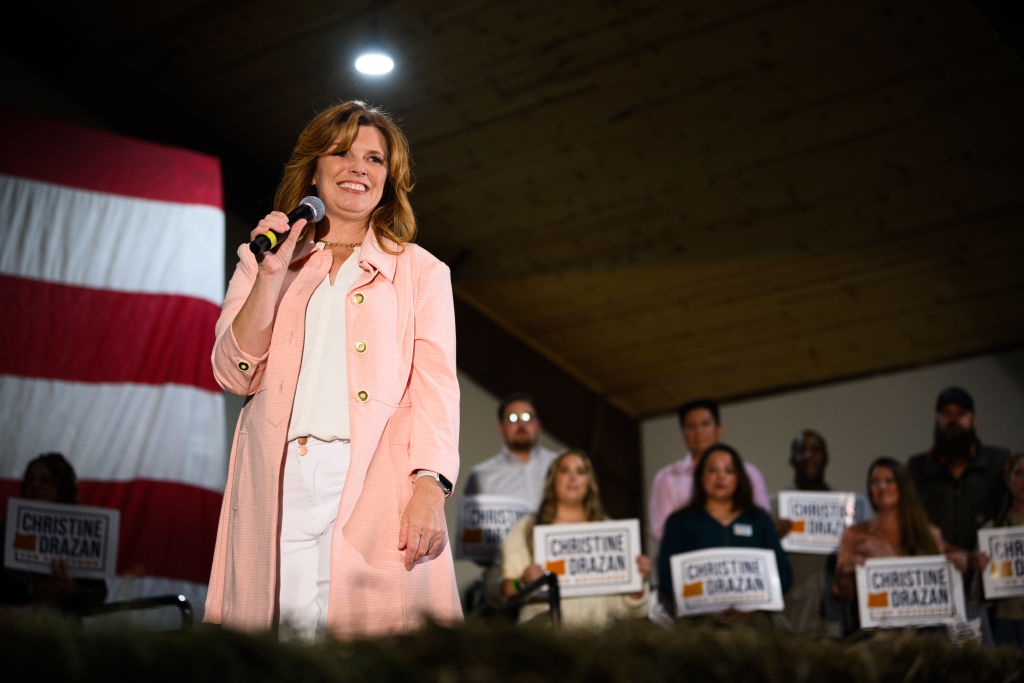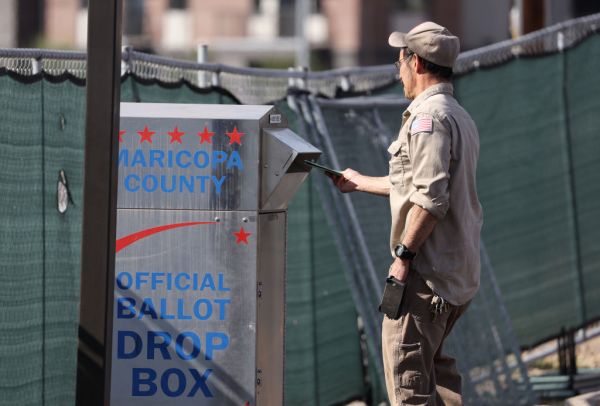Single-party control has put Oregon on the wrong track, Christine Drazan said at Oregon’s final gubernatorial debate Wednesday. “I want to bring Oregon back to balance again and the way you’re going to do that, in fact, is to elect a Republican. It’s not a hard right, it’s called balance.”
It’s a tall order in a state where Republicans haven’t won the governor’s mansion in 40 years. Yet Drazan, former minority leader of the Oregon House of Representatives, has put herself in contention with a disciplined campaign and moderate message. A third-party candidate’s presence, and former President Donald Trump’s absence, have helped too.
Drazan is up against former state House Speaker Tina Kotek, a Democrat, and the unaffiliated Betsy Johnson, a former state lawmaker. Drazan is ahead by around three points, according to RealClearPolitics’ average, and Sabato’s Crystal Ball and the Cook Political Report rate the race a “Toss-Up.” It’s not hard to figure out why.
The term-limited Gov. Kate Brown, a Democrat, is the least popular governor in America. The state has a disproportionately high level of homelessness; ranks among the most expensive states to live in; and last year its largest city, Portland, reported a record number of homicides. The city has also been the site of grim clashes between extremist groups.
Drazan has styled herself as a centrist Republican, largely avoiding controversies that animate much of the Republican base: she talked vaguely about the importance of “election integrity” during the GOP primary but sidestepped conspiracies. “Joe Biden is our president today, and in Oregon he absolutely won Oregon by 15 points,” she said in one primary debate.
Selling herself as a moderate has been easier with Trump staying out of the race. “Trump is a non-issue,” Jim Moore, a political science professor at Pacific University, said. “It’s left Christine Drazan the opportunity to go to the center.”
Nor has abortion proved an effective issue for Drazan’s opponents. The Republican, who describes herself as pro-life, has said she would veto legislation to expand funding for abortion but would “follow existing law.” The state has no major restrictions on abortion.
Instead, Drazan’s communications director said in an interview that Drazan’s focus remains on “kitchen table issues that matter most to Oregonian families: affordability, education, homelessness, crime.”
Drazan has also gone on offense, criticizing Kotek for her support for a state referendum that decriminalized possessing small amounts of hard drugs like cocaine, heroine, and meth. Both Drazan and Johnson have said they would seek to repeal the referendum.
Her attack on Democratic dominance of state politics at the debate was not a one-off, with the rest of the GOP following suit. “As hard as Democrats have fought to make Oregon a ‘progressive utopia,’ nearly two decades of single-party rule by the radical left have only driven our state into a real-world liberal dystopia,” Oregon Republican Party Chairman Justin Hwang said in a statement to The Dispatch.
The Kotek and Johnson campaigns did not respond to requests for comment.
Competent as Drazan’s campaign has been, her chances would be much slimmer if not for the unaffiliated Johnson.
During her legislative career, when Johnson still belonged to the Democratic Party, “she was the crucial pivotal vote. That elevated her in power in the building to be as powerful as the leader of the Senate or the leader of the House, and also got her in the news a lot,” Moore explained. This paved the way for a viable third party effort.
Johnson has billed herself a political maverick, describing her policies as “pro-choice, pro-cop, pro-change, pro-accountability.” She criticized the left, calling Portland the “city of roaches” and saying that Kotek wants to leave the state “woke and broke.” In the debate Wednesday, Johnson characterized her opponents as a “left-wing liberal promising more of the same or a right-wing Trump apologist.”
Forty-two percent of Oregonian voters have a favorable opinion of Drazan, according to an Emerson College poll. That is better than Kotek (38 percent) or Johnson (36 percent). And it may be enough for a win in Oregon: It seems likely that no candidate will reach 50 percent of the vote, with the winner needing only a plurality.
“While Oregon hasn’t elected a Republican governor since 1982, the races are often somewhat close—every one except 1998 was a single-digit race,” Kyle Kondik, managing editor of Sabato’s Crystal Ball, said. “In some ways, Republicans are due for a win in Oregon.”









Please note that we at The Dispatch hold ourselves, our work, and our commenters to a higher standard than other places on the internet. We welcome comments that foster genuine debate or discussion—including comments critical of us or our work—but responses that include ad hominem attacks on fellow Dispatch members or are intended to stoke fear and anger may be moderated.